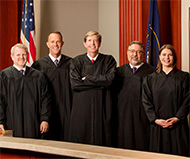Article from: www.thenewspaper.com/news/69/6967.asp
8/26/2020
Utah Supreme Court Allows Take-Back On Red Light Testimony
High court in Utah allows retraction of unequivocal testimony in a traffic accident case.
 Video evidence is now stronger than mere testimony in Utah traffic cases. A divided state Supreme Court on Thursday overturned lower court judges who insisted that testimony, once given, cannot be taken back. The justices had under consideration the case of Luis Luna who sued his sister Maria after he was injured riding with her. The suit was quickly thrown out because he said his sister had the right-of-way just before the collision, which several judges saw as a fatal admission.
Video evidence is now stronger than mere testimony in Utah traffic cases. A divided state Supreme Court on Thursday overturned lower court judges who insisted that testimony, once given, cannot be taken back. The justices had under consideration the case of Luis Luna who sued his sister Maria after he was injured riding with her. The suit was quickly thrown out because he said his sister had the right-of-way just before the collision, which several judges saw as a fatal admission.
"Under the approach the district court employed, and the court of appeals endorsed, if Luis testified the light was green, and Maria agreed, it was green," Justice John A. Pearce wrote for the Supreme Court majority. "Even if Luis could offer traffic camera video showing that the light was red, and could buttress that video with the testimony of twenty-seven nuns on their way home from Mass attesting that the light was red, Luis could still not defeat summary judgment and let a trier of fact decide what color the light really was."
Luis Luna was in the passenger seat as Maria Luna proceeded into a Salt Lake City intersection and motorist Antonio Arias entered from the other direction. The cars collided. Arias insisted that he was the one with the green light. During a deposition, Luis Luna also was emphatic that it was his sister that had the green light.
"I will repeat myself," he said. "It was green when we went through it."
The lower courts threw out the suit on summary judgment, arguing that the main fact of the case -- whether Maria Luna had the green light or not -- was not in dispute because the admission that Luis Luna made was binding. Luis Luna said that was incorrect, since he had the testimony of Arias, the other driver, who insisted Maria Luna had a red light. Luis Luna also pointed out that he was going to work that morning and was not focused on looking at the traffic lights, and that a jury should have a chance to sort out the facts.
"Although we understand why the district court and court of appeals would credit policies of efficiency and the seeming unseemliness of allowing a party to contradict her own testimony, we conclude that the truth-finding function of the trial process deserves more weight than the lower courts ascribed to it," Justice Pearce wrote. "A party's deposition testimony is like any other evidentiary admission and can be contradicted with other credible evidence."
A copy of the ruling is available in a 250k PDF file at the source link below.
Source: Luna v. Luna (Utah Supreme Court, 8/20/2020)
Permanent Link for this item
Return to Front Page
 Video evidence is now stronger than mere testimony in Utah traffic cases. A divided state Supreme Court on Thursday overturned lower court judges who insisted that testimony, once given, cannot be taken back. The justices had under consideration the case of Luis Luna who sued his sister Maria after he was injured riding with her. The suit was quickly thrown out because he said his sister had the right-of-way just before the collision, which several judges saw as a fatal admission.
Video evidence is now stronger than mere testimony in Utah traffic cases. A divided state Supreme Court on Thursday overturned lower court judges who insisted that testimony, once given, cannot be taken back. The justices had under consideration the case of Luis Luna who sued his sister Maria after he was injured riding with her. The suit was quickly thrown out because he said his sister had the right-of-way just before the collision, which several judges saw as a fatal admission.